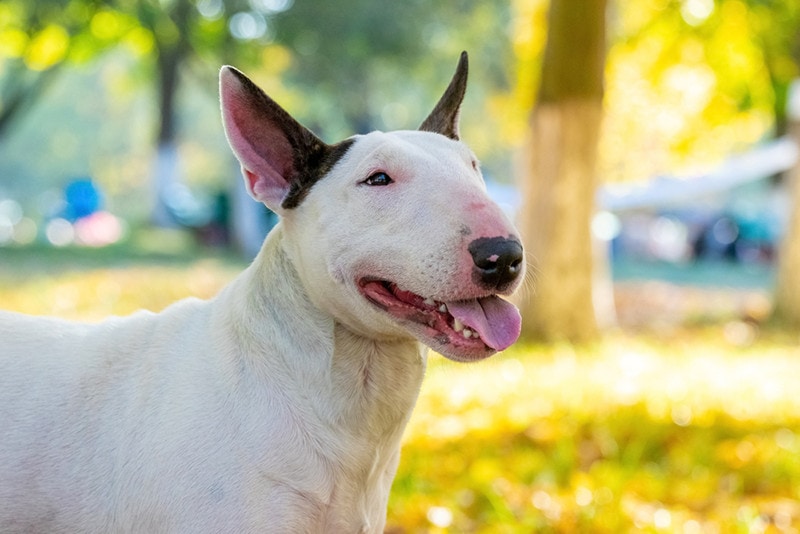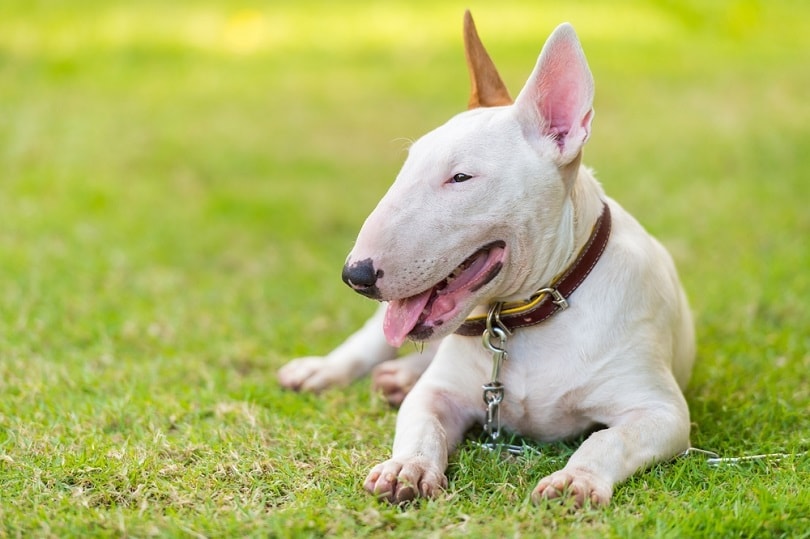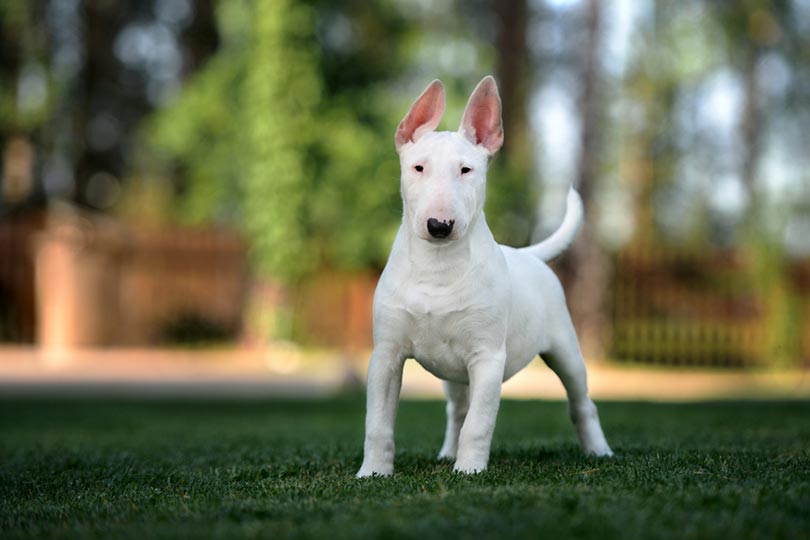Are Bull Terriers Smart? Average Breed Intelligence & FAQ
Updated on

Bull Terriers are not “traditionally” smart. It takes them a while to learn commands and obey commands. They aren’t the most obedient dogs, which is usually how experts rate intelligence. However, there are other ways for a dog to be intelligent.
Bull Terriers have high intuitive intelligence, which means they are good at hunting and chasing prey. They’re very good at hunting, which takes a lot of smarts. They weren’t bred to take their cues from a human owner, though, which has led to them being quite independent and scoring low on traditional scores of intelligence.
They’re certainly not dumb dogs—they just don’t have a habit of listening to their owners very often.
Common Bull Terrier Behavioral Problems
Bull Terriers don’t hit the “usual” definition of a smart dog and they are prone to some behavioral problems.
For one, they are more difficult to socialize. They’re very instinctual dogs, which means they may be more likely to be aggressive if not properly socialized. While they aren’t large dogs, socializing them is still necessary. They can become fearful of others and may not listen to commands when overwhelmed (which can lead to more issues).
Potty training is notoriously hard for these dogs, as they are independent and less likely to take cues from their owners, including urinating in the proper place. Therefore, you should plan on potty training them carefully and consistently. They will take longer to housetrain than some other dogs.
For one reason or another, these dogs are also prone to obsessive-compulsive behaviors. They may chase their tail, over-groom, or engage in other compulsive behaviors. In many cases, these behaviors are not necessarily troublesome and may not affect the dog’s quality of life. However, if done too much (or particularly troublesome behaviors are done), then training may be necessary.
These behaviors are considered serious, so you should speak to your vet about them.
Bull Terriers are also prone to eating things they shouldn’t. They aren’t the most obedient dog regarding the “leave-it” command, which can worsen problems. For this reason, we highly recommend carefully measuring their food and avoiding putting non-edibles on the ground. If your dog is prone to eating things, it shouldn’t speak with your vet.
Are Bull Terriers Hard to Train?
Bull Terriers are not easy to train, so we recommend them to experienced dog owners. They may figure out what you’re trying to say relatively easily, but that doesn’t mean they will do it. Patience and consistency are key.
They can respond well to a proper handler, though. Once training and basic obedience take hold, they can be easy dogs to care for. However, it takes them longer to understand that they must always follow a command.

How Do I Train My Bull Terrier?
Training your Bull Terrier is just like training any other canine—except you’ll need much more patience. These dogs simply take longer to train. Use positive reinforcement (like treats and toys) to make training fun. Otherwise, your dog may not engage. Also, remember that your dog learning a command in a training session doesn’t mean they’ll follow it outside of a training session. Therefore, you’ll also need to implement your training commands in daily life.
Start socializing your Bull Terrier early, as this will help them get used to interacting with others. You should expose them to people, dogs, sounds, and smells. Otherwise, they may become fearful later on. As soon they begin their puppy vaccinations, you should start socialization (and training, though it’s particularly important for socialization to start early).
Because these dogs aren’t the most obedient, you’ll need to keep training sessions particularly short. They have very short attention spans, so aim for no more than 15 minutes at a time. You’ll need to limit your training sessions to an even shorter period and build up from there.
Plan on being very patient with these dogs, who are stubborn and independent. Don’t expect them to learn and follow commands overnight; consistent results will likely take weeks or even months.
We highly recommend getting these dogs involved in puppy classes. These classes can help jump-start training and provide a place for safe socialization. While private classes may be advertised as the “premium” option, we recommend group classes for all dogs that aren’t instantly aggressive toward other canines. Group classes simply have lots of socialization benefits that are hard to recreate.

Are Bull Terriers Good House Dogs?
Bull Terriers are great house dogs when properly trained and socialized. Like all breeds, how you raise them matters—especially in this breed’s case.
These dogs tend to be very independent, making many decisions instead of taking their owners’ cues. If they’re well-socialized and understand basic obedience, this may leave you with a good dog even when you aren’t looking (which is what we all want). However, they may be overly fearful and aggressive if they aren’t well-socialized.
Bull Terriers must be given the proper information they need to make good decisions, and that’s accomplished through socialization.
That said, these dogs aren’t good for everyone. They can be strong-willed and stubborn. Therefore, they require more consistent training than other dogs. Furthermore, these dogs also require a great deal of socialization. They can become destructive and noisy if they aren’t exercised and entertained.
These dogs are best for those who can devote much time to their needs. They need spacious, secure homes where they can run and play freely. Apartment living or families gone for much of the day don’t work well with this breed.
Conclusion
Bull Terriers don’t rate very well in the “traditional” doggie intelligence test. They aren’t the most obedient and take longer to pick up on commands, which leads to them falling lower on the list of intelligent dogs.
However, that doesn’t mean they aren’t smart—they just don’t put their smarts toward obedience. They would rather make their own decisions, which often makes them quite stubborn and independent. For some owners, this is exactly what they’re looking for. However, it can get in the way of training, as they’re less likely to take cues from their owners.
Training these dogs requires a lot of patience and consistency. You’ll need to socialize and train them extremely early. Otherwise, they can be harder to handle as adults.
Featured Image Credit: MVolodymyr, Shutterstock












